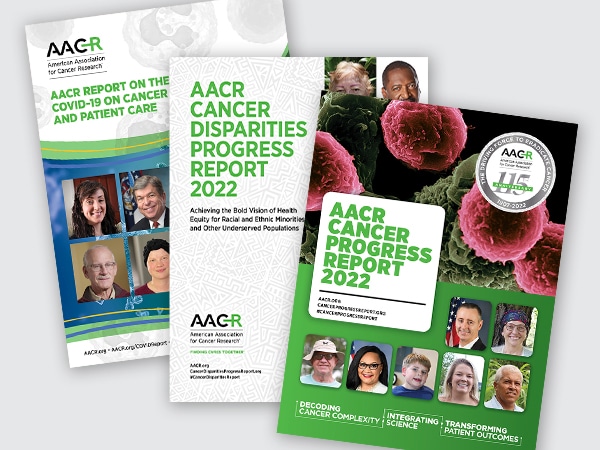AACR Virtual Annual Meeting II: Early-career Investigators Present Research at NextGen Stars Sessions
“It’s going to be a vibrant session,” said session moderator Nada Jabado, MD, PhD. With these words, the first of two sessions featuring the “NextGen Stars” began.
The AACR NextGen Grants for Transformative Cancer Research support early-career investigators who are pursuing highly innovative cancer research projects that have the potential to transform the field’s understanding of cancer development and/or treatment.
Each year, selected recipients are given the opportunity to present their research at the AACR Annual Meeting. This year’s Virtual Annual Meeting II, held online June 22-24, included two sessions featuring the diverse work of these NextGen Stars.
Cancer Models
Model systems are powerful tools for preclinical cancer research; however, they may not fully reflect the biology of cancer within a patient. Two presentations in one of the NextGen Stars sessions discussed potential ways to improve cancer models: The first reported a novel model system for glioblastoma, while the second examined the impact of genomic evolution in cancer models.

Joshua Breunig, PhD, associate professor of biomedical sciences at Cedars-Sinai Medical Center, explained that current glioblastoma models do not reflect the heterogeneity of driver mutations that exist in human glioblastomas. To address this gap, Breunig and colleagues developed mouse models of glioblastoma by injecting engineered DNA directly into the forebrains of newly born mice and using electrical pulses to drive the DNA into dividing cells in the brain. The injected DNA was designed to recombine with cellular DNA to generate distinct mutations. By using different electrodes and by changing the direction of the current, they were also able to alter features of the resulting tumor, such as the region of the brain in which it formed. Breunig and colleagues used this technique to model a specific mutation signature that has been observed in human glioblastomas. They verified that the tumors formed where expected and that the mouse model recapitulated phenotypes observed in patients.

The second presentation was delivered by Uri Ben-David, PhD, assistant professor of human molecular genetics and biochemistry at Tel Aviv University in Israel, and focused on genomic evolution of cancer models. Ben-David explained that all biological models, including cell lines, patient-derived xenograft models, and organoid models, are subject to genomic evolution. Furthermore, Ben-David and colleagues demonstrated that such genomic evolution affected phenotype, as different strains of the same cell line had varying levels of sensitivity to the same drug. Ben-David suggested that genomic evolution of models could explain inconsistencies across drug screens performed in different laboratories; however, he added that evolution of cancer models could also be harnessed as a tool to study drug resistance or to understand selective pressures that may exist in patients.
Ben-David said, “We believe that by understanding our model systems better, we can increase their utility, increase their reproducibility, and ultimately increase the biological and clinical relevance of basic cancer research.”
Other studies presented during the NextGen Stars sessions utilized cancer models and/or patient data to study tumor heterogeneity, epigenetics, immunology, and breast cancer.
Heterogeneity and Epigenetics
Heterogeneity within a tumor can impact clinical responses to treatments. A study presented during the first session used a technique called spatial transcriptomics to characterize heterogeneity within ovarian cancer tissue. This technique revealed differences in gene expression and inflammation between distinct regions of the tissue that could contribute to different clinical responses. To understand how tumor heterogeneity might arise, another study presented during the session examined the role of mutations and found that somatic mutations drove the development of epigenetic heterogeneity in acute myeloid leukemia.
Other studies in this session focused on understanding the role of epigenetics and chromatin in cancer. One study found that mutations in an epigenetic ‘reader’ protein impacted gene expression, while another found that loss of a chromatin-regulating gene led to heterogeneity in gene expression and resistance to androgen receptor-targeted therapy in prostate cancer cells.
Immunology
Multiple studies presented by the NextGen Stars examined factors that contribute to immunotherapy responses. One study characterized how patient-specific neoepitopes affected T-cell responses to immunotherapy. Another study uncovered that the efficacy of a CD40 agonist in combination with an immune checkpoint inhibitor for pancreatic ductal adenocarcinoma could be partially due to the expansion and accumulation of systemic and local antitumor T cells. A third study examined how a patient’s metabolism impacted overall survival when treated with nivolumab, an anti-PD-1 immune checkpoint inhibitor. They found that patients treated with nivolumab who had greater tryptophan-to-kynurenine conversion had reduced overall survival. Finally, researchers of another study examined the therapeutic potential of inhibiting protein degradation to induce immune-cell infiltration and immunogenic cell death in cancer cells with microsatellite instability.
Breast Cancer
Two presentations in one of the NextGen Stars sessions focused on breast cancer. One study examined asymmetry in breast density and its association with breast cancer risk factors and reported that asymmetry was not correlated with other known risk factors. The second study examined the response of breast cancer to PI3Kα inhibitors, a type of targeted cancer therapy. They found that patients whose tumors had multiple mutations in the PIK3CA gene had greater responses to these inhibitors.
AACR Award for Outstanding Achievement in Basic Cancer Research
In addition to presentations by NextGen Stars, the second session also included recognition of the recipient of the inaugural AACR Award for Outstanding Achievement in Basic Cancer Research, which recognizes early-career investigators under the age of 46 for meritorious contributions to basic cancer research. This year’s recipient was Cigall Kadoch, PhD, an assistant professor of pediatric oncology at Dana-Farber Cancer Institute, assistant professor of pediatrics at Harvard Medical School, and an Institute Member at the Broad Institute of MIT and Harvard. She received the award for her research on the SWI/SNF chromatin remodeling complexes and their impact on cancer.
As explained by Kadoch, perturbations of SWI/SNF subunits alter the function of the complexes and contribute to at least 20 percent of human cancers. Kadoch’s research has uncovered insights into the composition, assembly, structure, and function of these complexes.

“This award is particularly important to me as it signifies the excitement around the work we have done and the likely many ways our peer scientists see it being valuable going forward— from a basic biological understanding of human cancer to the development of new classes of targeted therapeutics,” Kadoch said.
She also acknowledged the work of graduate students, postdoctoral fellows, research staff, collaborators, and others in her research, adding that “these are groups of people who have not been afraid to venture out into the unknown, break down barriers to progress, and tackle challenging experiments to uncover new biology.”
Together, the breadth of research presented during the two NextGen Stars sessions highlights the impact early-career investigators have on advancing cancer research.


